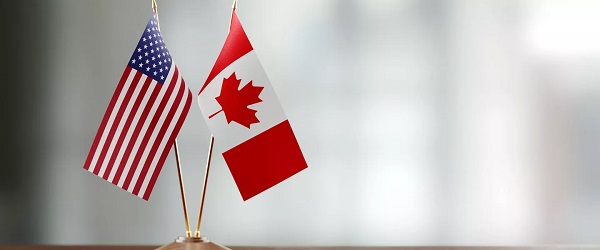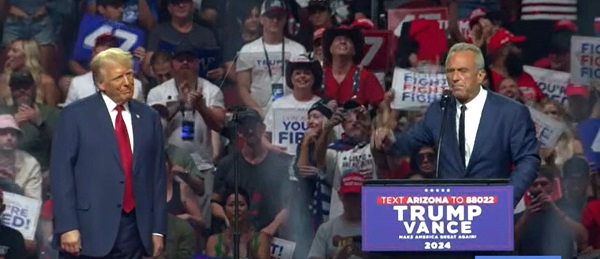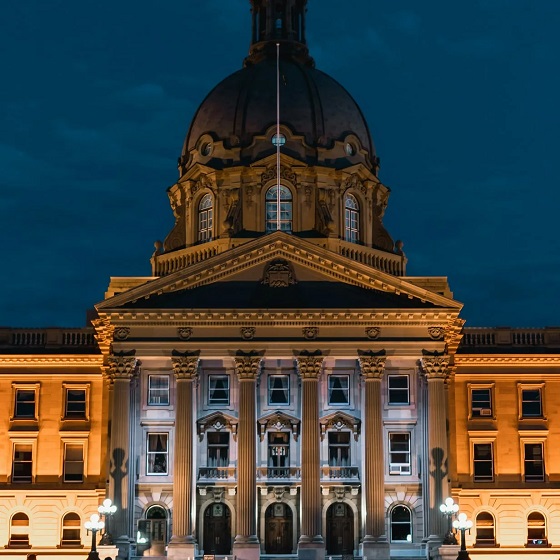Business
Trump, taunts and trade—Canada’s response is a decade out of date

From the Fraser Institute
Canadian federal politicians are floundering in their responses to Donald Trump’s tariff and annexation threats. Unfortunately, they’re stuck in a 2016 mindset, still thinking Trump is a temporary aberration who should be disdained and ignored by the global community. But a lot has changed. Anyone wanting to understand Trump’s current priorities should spend less time looking at trade statistics and more time understanding the details of the lawfare campaigns against him. Canadian officials who had to look up who Kash Patel is, or who don’t know why Nathan Wade’s girlfriend finds herself in legal jeopardy, will find the next four years bewildering.
Three years ago, Trump was on the ropes. His first term had been derailed by phony accusations of Russian collusion and a Ukrainian quid pro quo. After 2020, the Biden Justice Department and numerous Democrat prosecutors devised implausible legal theories to launch multiple criminal cases against him and people who worked in his administration. In summer 2022, the FBI raided Mar-a-Lago and leaked to the press rumours of stolen nuclear codes and theft of government secrets. After Trump announced his candidacy in 2022, he was hit by wave after wave of indictments and civil suits strategically filed in deep blue districts. His legal bills soared while his lawyers past and present battled well-funded disbarment campaigns aimed at making it impossible for him to obtain counsel. He was assessed hundreds of millions of dollars in civil penalties and faced life in prison if convicted.
This would have broken many men. But when he was mug-shotted in Georgia on Aug. 24, 2023, his scowl signalled he was not giving in. In the 11 months from that day to his fist pump in Butler, Pennsylvania, Trump managed to defeat and discredit the lawfare attacks, assemble and lead a highly effective campaign team, knock Joe Biden off the Democratic ticket, run a series of near daily (and sometimes twice daily) rallies, win over top business leaders in Silicon Valley, open up a commanding lead in the polls and not only survive an assassination attempt but turn it into an image of triumph. On election day, he won the popular vote and carried the White House and both Houses of Congress.
It’s Trump’s world now, and Canadians should understand two things about it. First, he feels no loyalty to domestic and multilateral institutions that have governed the world for the past half century. Most of them opposed him last time and many were actively weaponized against him. In his mind, and in the thinking of his supporters, he didn’t just defeat the Democrats, he defeated the Republican establishment, most of Washington including the intelligence agencies, the entire corporate media, the courts, woke corporations, the United Nations and its derivatives, universities and academic authorities, and any foreign governments in league with the World Economic Forum. And it isn’t paranoia; they all had some role in trying to bring him down. Gaining credibility with the new Trump team will require showing how you have also fought against at least some of these groups.
Second, Trump has earned the right to govern in his own style, including saying whatever he wants. He’s a negotiator who likes trash-talking, so get used to it and learn to decode his messages.
When Trump first threatened tariffs, he linked it to two demands: stop the fentanyl going into the United States from Canada and meet our NATO spending targets. We should have done both long ago. In response, Trudeau should have launched an immediate national action plan on military readiness, border security and crackdowns on fentanyl labs. His failure to do so invited escalation. Which, luckily, only consisted of taunts about annexation. Rather than getting whiny and defensive, the best response (in addition to dealing with the border and defence issues) would have been to troll back by saying that Canada would fight any attempt to bring our people under the jurisdiction of the corrupt U.S. Department of Justice, and we will never form a union with a country that refuses to require every state to mandate photo I.D. to vote and has so many election problems as a result.
As to Trump’s complaints about the U.S. trade deficit with Canada, this is a made-in-Washington problem. The U.S. currently imports $4 trillion in goods and services from the rest of the world but only sells $3 trillion back in exports. Trump looks at that and says we’re ripping them off. But that trillion-dollar difference shows up in the U.S. National Income and Product Accounts as the capital account balance. The rest of the world buys that much in U.S. financial instruments each year, including treasury bills that keep Washington functioning. The U.S. savings rate is not high enough to cover the federal government deficit and all the other domestic borrowing needs. So the Americans look to other countries to cover the difference. Canada’s persistent trade surplus with the U.S. ($108 billion in 2023) partly funds that need. Money that goes to buying financial instruments can’t be spent on goods and services.
So the other response to the annexation taunts should be to remind Trump that all the tariffs in the world won’t shrink the trade deficit as long as Congress needs to borrow so much money each year. Eliminate the budget deficit and the trade deficit will disappear, too. And then there will be less money in D.C. to fund lawfare and corruption. Win-win.
Business
Loblaws Owes Canadians Up to $500 Million in “Secret” Bread Cash

Yakk Stack
(Only 5 Days Left!) Claim Yours Before It’s GONE FOREVER
Hey, all.
Imagine this…you’re slicing into that fresh loaf from Loblaws or just making a Wonder-ful sammich, the one you’ve bought hundreds of times over the years, and suddenly… ka-ching!
A fat check lands in your mailbox.
Not from a lottery ticket, not from a side hustle – from the very store that’s been quietly owing you money for two decades of illegal price fixing.
Sound too good to be true?
It’s real.
It’s court-approved.
And right now, on December 7, 2025, you’ve got exactly 5 days to grab your share before the door slams shut. Don’t let this slip away – keep reading, feel that spark of possibility ignite, and let’s get you paid.
Back in 2001, you were probably juggling work, kids, or just surviving on that weekly grocery run. Little did you know, while you were reaching for the President’s Choice white bread or those golden rolls, Loblaws and their cronies were playing a sneaky game of price-fixing. They jacked up the cost of packaged bread across Canada – every loaf, every bun, every sneaky sandwich slice. For 20 years. From coast to coast to coast.
And now…the courts have spoken. $500 million in settlements to make it right. That’s not pocket change – that’s your money, recycled back into your life.
Given the number of people who will be throwing in a claim…this ain’t gunna be life-changing cash…but also, given the cost of food in Canada, it’s better than sweet fuck all, which you will receive by NOT doing this.
If you’re a Canadian resident (yep, that’s you, unless you’re in Quebec with your own sweet deal), and you’ve ever bought bread for your family – not for resale, just real life – between January 1, 2001, and December 31, 2021… you’re in.
No receipts needed.
No fancy proofs.
Just you, confirming your story, and boom – eligible.
Quick check: Were you under 18 back then?
Or an exec at Loblaw?
Nah, skip it.
But for the rest of us everyday schleps…Jackpot.
Again…the clock’s ticking on this.
Claims opened on September 11, 2025, and slam shut on December 12, 2025.
That’s this Friday.
Payments roll out in 2026, 6-12 months later, straight to your bank or mailbox.
Here’s what you need to do…
- Breathe deep, click → HEREQuebec frens →HERE
- 10 second form that’s completed by your autofill…30 seconds off of a mobile device.
- Hit submit and wait for that sweet cash to hit your account.
Again…this won’t be life saving money and most certainly ain’t gunna hit your account before Christmas.
And before you go out an Griswald yourself into a depost on pool in the backyard…you may only end up with enough cash for the Jam-of-the-Month…the gift that truly does give, all year round…just be a little patient.
If you end up with a couple of backyard steaks in time for summer…
Some treats for the children or grandchildren…
Maybe just a donation to the foodbank…
This is what’s owed to you. Your neighbors. Friends. Family.
Take advantage!
Banks
To increase competition in Canadian banking, mandate and mindset of bank regulators must change

From the Fraser Institute
By Lawrence L. Schembri and Andrew Spence
Canada’s weak productivity performance is directly related to the lack of competition across many concentrated industries. The high cost of financial services is a key contributor to our lagging living standards because services, such as payments, are essential input to the rest of our economy.
It’s well known that Canada’s banks are expensive and the services that they provide are outdated, especially compared to the banking systems of the United Kingdom and Australia that have better balanced the objectives of stability, competition and efficiency.
Canada’s banks are increasingly being called out by senior federal officials for not embracing new technology that would lower costs and improve productivity and living standards. Peter Rutledge, the Superintendent of Financial Institutions and senior officials at the Bank of Canada, notably Senior Deputy Governor Carolyn Rogers and Deputy Governor Nicolas Vincent, have called for measures to increase competition in the banking system to promote innovation, efficiency and lower prices for financial services.
The recent federal budget proposed several new measures to increase competition in the Canadian banking sector, which are long overdue. As a marker of how uncompetitive the market for financial services has become, the budget proposed direct interventions to reduce and even eliminate some bank service fees. In addition, the budget outlined a requirement to improve price and fee transparency for many transactions so consumers can make informed choices.
In an effort to reduce barriers to new entrants and to growth by smaller banks, the budget also proposed to ease the requirement that small banks include more public ownership in their capital structure.
At long last, the federal government signalled a commitment to (finally) introduce open banking by enacting the long-delayed Consumer Driven Banking Act. Open banking gives consumers full control over who they want to provide them with their financial services needs efficiently and safely. Consumers can then move beyond banks, utilizing technology to access cheaper and more efficient alternative financial service providers.
Open banking has been up and running in many countries around the world to great success. Canada lags far behind the U.K., Australia and Brazil where the presence of open banking has introduced lower prices, better service quality and faster transactions. It has also brought financing to small and medium-sized business who are often shut out of bank lending.
Realizing open banking and its gains requires a new payment mechanism called real time rail. This payment system delivers low-cost and immediate access to nonbank as well as bank financial service providers. Real time rail has been in the works in Canada for over a decade, but progress has been glacial and lags far behind the world’s leaders.
Despite the budget’s welcome backing for open banking, Canada should address the legislative mandates of its most important regulators, requiring them to weigh equally the twin objectives of financial system stability as well as competition and efficiency.
To better balance these objectives, Canada needs to reform its institutional framework to enhance the resilience of the overall banking system so it can absorb an individual bank failure at acceptable cost. This would encourage bank regulators to move away from a rigid “fear of failure” cultural mindset that suppresses competition and efficiency and has held back innovation and progress.
Canada should also reduce the compliance burden imposed on banks by the many and varied regulators to reduce barriers to entry and expansion by domestic and foreign banks. These agencies, including the Office of the Superintendent of Financial Institutions, Financial Consumer Agency of Canada, Financial Transactions and Reports Analysis Centre of Canada, the Canada Deposit Insurance Corporation plus several others, act in largely uncoordinated manner and their duplicative effort greatly increases compliance and reporting costs. While Canada’s large banks are able, because of their market power, to pass those costs through to their customers via higher prices and fees, they also benefit because the heavy compliance burden represents a significant barrier to entry that shelters them from competition.
More fundamental reforms are needed, beyond the measures included in the federal budget, to strengthen the institutional framework and change the regulatory mindset. Such reforms would meaningfully increase competition, efficiency and innovation in the Canadian banking system, simultaneously improving the quality and lowering the cost of financial services, and thus raising productivity and the living standards of Canadians.
-

 Focal Points1 day ago
Focal Points1 day agoPharma Bombshell: President Trump Orders Complete Childhood Vaccine Schedule Review
-

 Automotive19 hours ago
Automotive19 hours agoTrump Deals Biden’s EV Dreams A Death Blow
-

 Automotive18 hours ago
Automotive18 hours agoCanada’s EV Mandate Is Running On Empty
-

 Business8 hours ago
Business8 hours agoWhy Does Canada “Lead” the World in Funding Racist Indoctrination?
-

 Media8 hours ago
Media8 hours agoThey know they are lying, we know they are lying and they know we know but the lies continue
-

 Daily Caller2 days ago
Daily Caller2 days agoTrump Orders Review Of Why U.S. Childhood Vaccination Schedule Has More Shots Than Peer Countries
-

 Alberta1 day ago
Alberta1 day agoA Memorandum of Understanding that no Canadian can understand
-

 Censorship Industrial Complex1 day ago
Censorship Industrial Complex1 day agoFrances Widdowson’s Arrest Should Alarm Every Canadian













